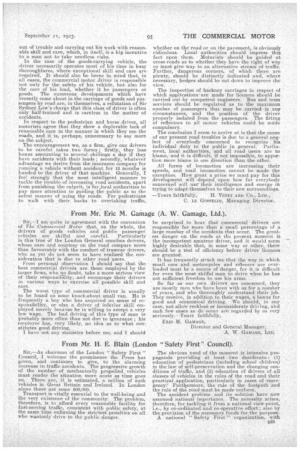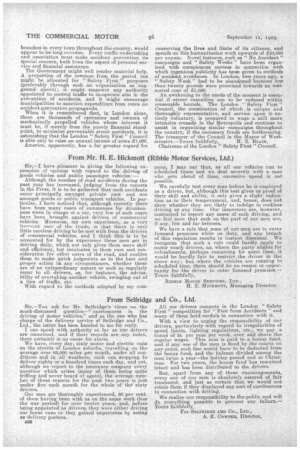From Mr. H. E. Blain (Lon don "Safety First" Council).
Page 11

Page 12

If you've noticed an error in this article please click here to report it so we can fix it.
Sir,—As chairman of the London " Safety First" Council, I welcome the prominence the Press has given, and continues to give, to the alarming increase in traffic accidents. The progressive growth of the number of mechanically propelled_ vehicles must render the situation more acute as time goes on. There are, it is estimated, a million of such vehicles in Great Britain and Ireland. In London alone there are some 200,000.
Transport is vitally essential to. the well-being and the very existence of the community. The problem, therefore, is to afford every reasonable facility for fast-moving traffic, consistent with public safety, at • the same time enforcing the strictest penalties on all who wantonly drive to the public danger.
The obvious need of the moment is intensive propaganda providing at least two desiderata..: (I) education 'of pedestrians (including school children) in the law of self-preservation and the changing conditions of traffic, and (2) education of drivers of all classes of vehicles in the rules of the road and their practical .application, particularly in cases of emergency.Furthermore, the rule of the footpath and the rule of the road must be made uniform.
The accident problem and its solution have now assumed national importance. The necessity arises, therefore, for tackling it from a, national view-point, i.e., by co-ordinated and co-operative effort ; also by the provision of the necessary funds for the purpose. A national " Safety First " organization, with branches in every town throughout the country, would appear to be long overdue. Every traffic undertaking and association must make accident prevention its special concern, both from the aspect of personal service and financial assistance.
The Government might well render material help. A proportion of the revenue from the petrol tax might be allocated for " Safety First" purposes (preferably through such an organization as suggested above); it might empower any authority appointed to control traffic to co-operate also in the prevention of 'accidents, and it might encourage municipalities to sanction expenditure from rates on accident-prevention propaganda. ' When it is remembered that, in London alone, there are thousands of operators and owners of mechanically propelled vehicles whose interest it must be, if merely from the purely financial standpoint, to minimize preventable street accidents, it is astonishing that the Loudon " Safety. First" council is able only to raise an annual income of some 21,000. America, apparently, has a far greater regard for conserving the lives and limbs of its citizens, and spends on this humanitarian work upwards of 240,000 per annum. Novel features, such as " No Accident" campaigns and "Safety Weeks" have been organized with , conspicuous success in connection with which ingenious ptiblicity has been given to methods of accident avoidance. In London, two years ago, a "Safety Week" had to be abandoned because less than twenty pounds were promised towards an estimated cost of 21,000.
An awakening to the needs of the moment is essential if street casualties are to be reduced within reasonable bounds_ The London "Safety First" Council, the constitution of which is unique and thoroughly representative, and service upon it entirely voluntary, is prepared to wage a still more intensive crusade in the Metropolis and continue to assist in organizing similar campaigns throughout the country, if the necessary funds are forthcoming. The treasurer of the Council is the Mayor of West minster.—Yours faithfully, H. E. BLAIN, Chairman of the London "Safety First" Council.


































